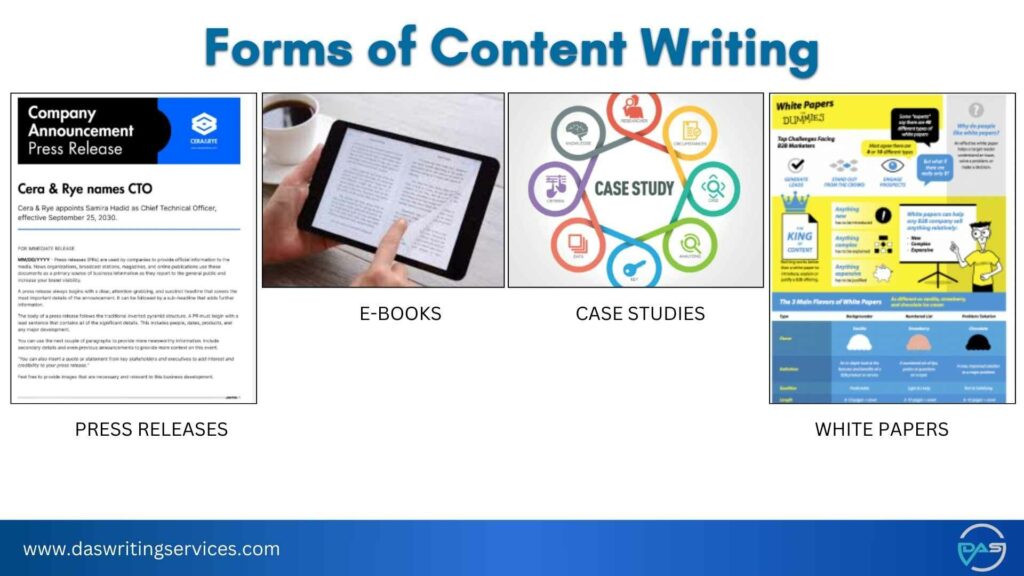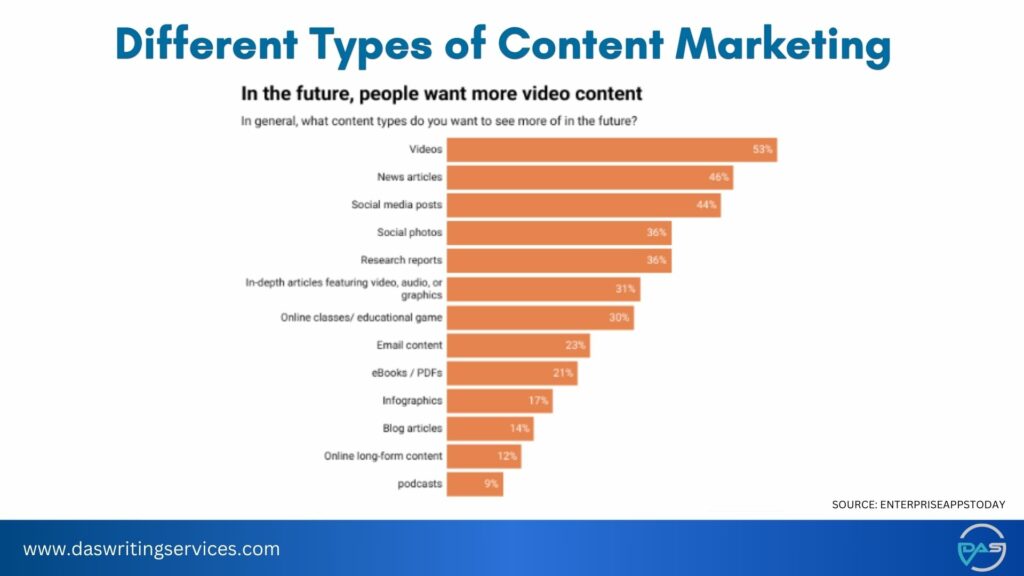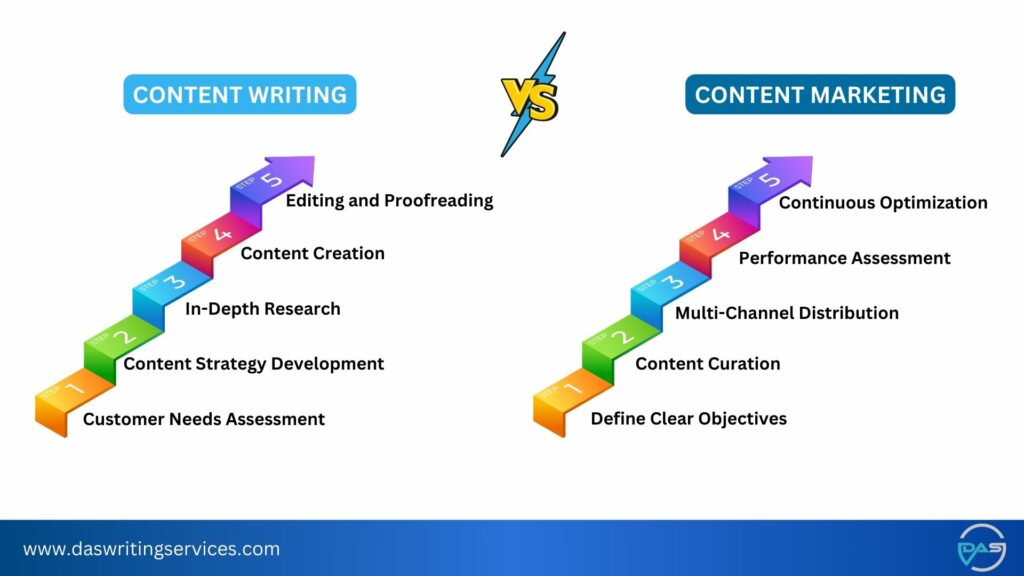While both involve creating textual content, content marketing goes one step ahead as to ensure that the content strategy and distribution channels are at sync to ensure efficiency and produce better outcomes.
Content writing focuses on producing high-quality written content that informs and educates the audience.
Content marketing, on the other hand, aims to attract and retain a clearly defined audience and ultimately lead to enhanced engagements. In this blog post, we’ll delve into the nuances of content writing vs content marketing and explore how they work together to achieve marketing goals.
If you want to take your content writing and marketing game to the next level, you can entrust us with the task. Our team of dedicated experts have the expertise to deliver the results you wish to achieve.
What is Content Writing
Content writing is a multifaceted discipline that extends beyond mere text. To create truly impactful content, writers must consider a myriad of elements, including captivating narratives, visually appealing graphics, and informative videos. Their goal is to not only produce engaging content but also optimize it for search engines to maximize its visibility.
The domain of content writing is vast, encompassing everything from technical documentation to creative storytelling. Whether it’s crafting a comprehensive e-book, developing a persuasive whitepaper, or writing an informative article, the ultimate aim is to deliver content that serves a specific purpose.
The intent behind a piece of content can vary widely. It might be to inform, persuade, entertain, or guide. Understanding the desired outcome is crucial for crafting effective content that resonates with the target audience.
Types of Content Writing
Content writing covers various formats and styles, with blogs being among the most prevalent. However, there are several other types of content writing, including:

- Press Releases: These are formal announcements intended for distribution to media outlets.
- E-books: Often available as downloadable PDFs, e-books serve as comprehensive guides or resources on particular subjects.
- Case Studies: These narratives detail factual accounts of how a company addressed challenges or enhanced services for a client.
- White Papers: These documents highlight the features of a product or service that the organization offers.
Each of these formats plays a crucial role in the broader landscape of content writing, catering to diverse audience needs and business objectives.
Duties of a Content Writer
A content writer is responsible for creating written material tailored to the target audience of a brand. It could be for a non-profit organization or a corporate entity that requires content across different customer facing as well as internal processes.
The process of content writing typically involves several key steps:
- Understanding Client Requirements: The writer begins by reviewing and adhering to the guidelines outlined in the client’s brief and style guide.
- Conducting Research: They conduct thorough research on the topic, sourcing information from credible sources.
- Drafting the Content: The writer develops the content, progressing from a wireframe to a polished final draft.
- Implementing SEO Strategies: They incorporate SEO techniques, such as internal linking and strategic keyword placement, to enhance visibility.
- Editing and Proofreading: Before submitting the article to the client, the writer meticulously edits and proofreads the work to ensure quality.
Content writers must possess the ability to adjust their writing style to align with the diverse persona of different brands. Additionally, storytelling has emerged as an essential skill for content writers, as marketers increasingly aim to produce content that resonates with audiences and evokes lasting emotional responses.
Content Writing and Copywriting: A Distinction
It is important to note that content writing differs from copywriting. The primary objective of content writing is to educate and inform audiences. In contrast, copywriting focuses mainly on persuading individuals to take specific actions that may lead to user conversion.
Understanding human behaviour is essential for both content writers and copywriters. Nevertheless, many copywriters also engage in content writing, and numerous content writers possess training in crafting persuasive sales copy.
What is Content Marketing
Content marketing is a strategic technique that involves creating and distributing valuable, relevant, and consistent content to attract and retain a clearly defined audience—and, ultimately, drive desired customer action. It’s more than just writing blog posts or sharing social media updates. It’s all about understanding your audience’s needs, developing a content strategy, and executing it effectively.
Some of the key components of content marketing are:
- Content Strategy: A well-defined plan outlining content goals, target audience, content formats, and distribution channels.
- Content Creation: Produce high-quality content that resonates with your audience, such as blog posts, articles, videos, infographics, and social media posts.
- Content Distribution: Sharing content on relevant platforms to maximize visibility and engagement.
- Content Analysis: Tracking the performance of your content to measure its impact and make data-driven improvements.
Types of Content Marketing
Brands often integrate various formats into their content marketing strategies in addition to text, such as:

- Webinars
- Videos
- Podcasts
- Social Media
An example of content marketing is Spotify Wrapped. This annual campaign provides users with personalized insights into their listening habits, presented in a visually appealing format similar to Instagram Stories. It encourages sharing on social media, generating significant buzz and engagement each year.
Duties of a Content Marketer
Content marketers are responsible for managing the content marketing process. Their goal is to ensure that appropriate content is produced at the right moment, effectively reaching the intended audiences in alignment with the brand’s marketing strategy.
Typically, the content marketing process encompasses several key activities:
- Research and Analysis: Studying competitors, target demographics, and relevant keywords.
- Strategy Development: Formulating a content strategy and creating an editorial calendar.
- Digital Management: Managing the organization’s website content hub and overseeing social media accounts.
- Performance Tracking: Monitoring and analyzing the performance of content across various channels.
- Content Oversight: Supervising the content creation process, this includes creating briefs and workflows.
Content Writing vs Content Marketing: Understanding the Distinction
Content writing and content marketing are integral components of a brand’s content strategy. Both share the common goal of regularly delivering high-quality, valuable, and attractive content to a specific audience, ultimately aimed at increasing organic traffic and generating new leads.
The question of which is more crucial—content writing vs content marketing—reveals that both are equally essential. A successful content marketing strategy cannot function without written content. Conversely, written content may not achieve its intended objectives without an accompanying content marketing plan.
Whether a content writer and a content marketer perform the same role depends largely on the size of the organization and the scope of its content needs.
For instance, a major corporation like Nike would typically have a comprehensive content marketing team that includes localization specialists for various regions and dedicated writers tasked with producing written materials aligned with the brand’s marketing plan.
In smaller businesses, it is quite common for the same individual to take on both content writing and content marketing roles. For instance, a solopreneur managing their own business would typically be tasked with developing their own content marketing strategy, even if it is implemented on a modest scale.
Content Writing vs Content Marketing: Difference in Steps Involved
In this section, we will understand the differences in the process involved in content writing vs content marketing:

Steps Involved in Content Writing
The following are the key steps involved in content writing:
- Assessing the needs of customers.
- Developing and organizing content strategies tailored to those needs.
- Conducting thorough research to gather the most current and precise information.
- Creating high-quality content that aligns with the client’s specifications, including tone, voice, language, and personality.
- Reviewing, refining, and finalizing content through editing and proofreading.
Steps Involved in Content Marketing
The following are the key steps involved in content marketing:
- Establish clear objectives to guide your content marketing efforts.
- Curate a diverse range of content that aligns with your strategy.
- Share your content on various channels to maximize visibility.
- Assess the effectiveness of your content by measuring engagement, reach, and lead generation.
- Continuously track performance metrics and adjust your marketing strategy for ongoing improvement.
Content Writing vs Content Marketing: Difference in Skill Set
Choosing between content writing and content marketing can be challenging, especially when considering your existing skills and what you still need to learn. It’s important to highlight the advantages of each field.
The roles in these areas demand different levels of expertise, and they come with unique educational backgrounds and skill requirements.
Skills Required for Content Writing
Content writing is a discipline that demands both industry knowledge and exceptional writing abilities. If you’re curious about what it takes to excel as a content writer, here’s a comprehensive list of essential skills:
- Strong Writing Ability: Mastery of language and style.
- Subject Matter Knowledge: Expertise in specific fields or topics.
- Linguistic Aptitude: Understanding nuances in language.
- Language Proficiency: A solid command of grammar and vocabulary.
- Research Skills: The ability to gather and analyze information effectively.
- Strategic Planning: Ability to outline and organize content effectively.
- Proofreading: Ensuring accuracy and correctness in the final piece.
- Literary Awareness: Familiarity with various literary forms and techniques.
- Creativity: The capacity to generate original ideas.
- Conciseness: The skill to convey messages clearly and succinctly.
- Editing Skills: Refining content for clarity and coherence.
- SEO Techniques: Knowledge of optimizing content for search engines.
- Plagiarism Checks: Ensuring originality in all written work.
Skills Required for Content Marketing
Content marketing involves a technical skill set that demands a solid grasp of data and analytics. Content writers often have a background in literature. However, those in content marketing usually possess degrees in marketing or related fields.
To be effective, content marketers need to be well-versed in a range of marketing software and tools. This expertise enables them to gather relevant statistics and develop effective content marketing strategies based on their findings.
Content marketers should be equipped with several key competencies, including:
- SEO: Understanding how to optimize content for search engines is crucial.
- Writing Proficiency: Strong writing skills are necessary for creating engaging and informative content.
- Expertise in Digital Marketing: A solid grasp of digital marketing principles is important for reaching target audiences.
- Strategic Planning: The ability to develop effective content marketing strategies is essential.
- Social Media Management: Managing social media platforms effectively is vital for brand visibility.
- Email Marketing: Skills in crafting compelling email campaigns can enhance audience engagement.
- Familiarity with Automation Tools: Knowledge of automation software can streamline marketing processes.
- Data Analysis Skills: The ability to analyze data helps in measuring the success of marketing efforts.
- Knowledge of Google Ads: Understanding how to utilize Google Ads can drive targeted traffic to content.
Content Writing vs Content Marketing: Key Performance Indicators (KPIs)
To understand how content writing compares with content marketing, we will take a look at the KPIs for each:
KPIs of a Content Writer
Here are the KPIs for a content writer:
- Originality of content
- Total number of blogs, articles etc. published
- Creation of content without mistakes
- Ability to understand project requirements
KPIs of a Content Marketer
Here are the KPIs for a content marketer:
- The volume of traffic the content gets
- Lead generation
- Overall conversions
- Reviews of the page
- Engagement statistics, including reviews, comments, and shares
- Rankings in search engines
- Follower count and retention percentage
How Content Marketing Depends on Content Writing
Till now, we have explored the different facets of content writing vs content marketing. While these two fields are distinct, it’s important to recognize that good content marketing relies heavily on quality content writing. Well-crafted content is essential for a successful marketing strategy, as it helps achieve specific objectives. Collaboration between content marketers and writers is crucial for developing strategies that yield the best possible outcomes.
Even the best marketing efforts cannot compensate for poorly written content. To be effective, content must be polished and meet a certain standard of quality. It includes implementing SEO best practices that adhere to ethical guidelines. High-quality content should not only provide valuable information but also engage readers through compelling visuals like infographics. When executed well, this type of content can drive significant organic traffic.
Takeaway
While content writing and content marketing are often used interchangeably, they are distinct disciplines with unique goals. Yet, their interdependence is undeniable.
Content writing serves as the foundation for effective content marketing. As we’ve explored, successful content marketing strategies hinge on well-crafted, SEO-optimized content that resonates with readers and encourages interaction.
To thrive in today’s digital landscape, businesses must recognize the value of both fields and foster collaboration between writers and marketers. Ultimately, understanding the nuances of content writing vs content marketing will empower organizations to harness their full potential, ensuring that their messages are not just heard but also remembered.
Frequently Asked Questions
- What is the difference between content writing vs content marketing?
Content writing is the process of creating written content, such as blog posts, articles, and social media updates. It focuses on producing high-quality content that is informative, engaging, and persuasive.
On the other hand, content marketing requires planning, creating, and promoting content to achieve specific marketing goals
- Can a content writer be a content marketer?
Yes, a content writer can be a content marketer, but they need to develop a deeper understanding of marketing principles and strategies.
- How can I measure the success of my content marketing efforts?
You need to track relevant metrics such as lead generation, sales, social media engagement, click-through rates, and website traffic to judge the success of your marketing efforts.
- Which is more important in content writing vs content marketing?
Both content writing and content marketing are crucial for successful marketing. While content writing provides the foundation, content marketing ensures that the content achieves the desired outcomes.

Ritish Dutta is a seasoned Content Developer with over 7 years of experience in the industry. Currently, at Das Writing Services, he writes SEO-optimized content that caters to our diverse clientele. Ritish utilizes his critical insights and experience to talk about digital marketing, SEO content writing, content strategy, and AI.






Leave a comment